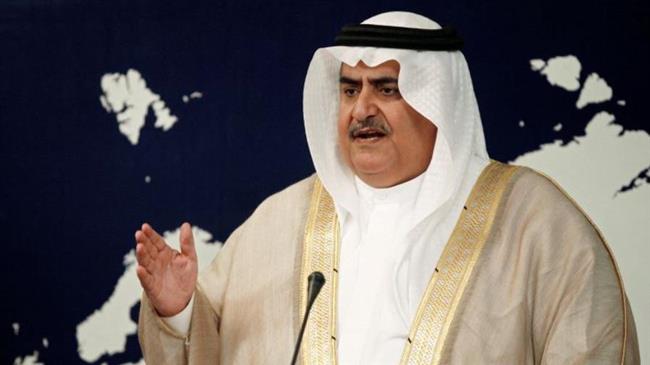
RNA - The dissolved political party, in a statement released on Sunday, described the remarks as “a disgrace ... [and] a crime against Islam, the Palestinian cause and the nation as a whole.”
Al-Wefaq then noted that such statements do not represent Bahrain or its people, who firmly reject normalization of ties with the Tel Aviv regime.
On Thursday, Khalifah said in an Arabic message on Twitter social media website that “Israel had a right to defend itself.”
The Associated Press recently revealed that Israeli Prime Minister Benjamin Netanyahu met with the Bahraini and Emirati ambassadors to the United States in March, shedding light on ulterior relations between the Tel Aviv regime and a number of Persian Gulf kingdoms.
The report said Netanyahu was in Washington to attend an annual pro-Israel policy conference, where he met Bahrain’s Sheikh Abdullah bin Rashed bin Abdullah Al Khalifah and Yousef al-Otaiba of the United Arab Emirates (UAE).
Otaiba and Sheikh Abdullah were having dinner with a US State Department official and others at a restaurant, where they were made aware of Netanyahu's presence.
The Emirati ambassador then invited the Israeli prime minister and his wife, Sara, to join their table.
"It wasn’t long before Netanyahu and his wife came over to say hello on their way out," the AP reported.
"They lingered, answering a few questions from the group about Iran and other issues. There were smiles, a few laughs about the oddity of the situation, and Netanyahu shook hands with the two ambassadors before leaving the restaurant," it said.
The meeting, the AP said, "sheds light on one of the worst kept secrets in the Arab world: the quiet ties between Israel and some of its Arab neighbors" which have been trying to sideline the Palestinian issue.
The interaction also casts light on how friendly cooperation between Israel and the Arab Persian Gulf nations, until recently kept behind the scenes, "are creeping into public view," it added.
According to Press TV, Netanyahu frequently boasts of growing, discreet cooperation with some Arab countries. Though he doesn’t identify them by name, they’ve long been believed to be Persian Gulf states such as the UAE and Saudi Arabia.
The Saudis recently broke a decades-old practice and agreed to allow Indian flights to Israel to pass through their airspace, cutting the trip by several hours.
The Saudi crown prince, Mohammad Bin Salman, even met with pro-Israel Jewish American leaders during his recent trip to the US.
847/940